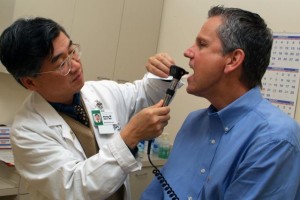In the news this week are reports that a member of the Beastie Boys hip-hop band announced on YouTube that he has salivary gland cancer – specifically of the parotid gland.

Dong Shin, MD, examines a patient at Emory
The public does not hear much about this type of cancer, and according to the American Cancer Society salivary gland cancers account for less than 1 percent of all cancers in the United States. About two out of three salivary gland cancers are found in people who are 55 or older. The average age at the time this cancer is found is 64.
The salivary gland is important because it Ray Ban outlet produces saliva, which contains enzymes that begin the process of breaking down food. It also contains substances to help prevent infections of the mouth and throat.
According to Emory Winship Cancer Institute expert Dong Shin, MD, the parotid glands are found in front of and just below each ear and most major salivary gland tumors begin in these glands.
Shin says that salivary gland tumors exhibit two major growth patterns: low grade, which is slow growing and more easily treatable, and high grade, which is usually a faster growing, more aggressive cancer that can also invade the lymph nodes. Certain types of salivary gland tumors can recur or have distant metastasis, particularly to the lungs.
Although the causes of this cancer are not definitively identified, Shin notes, there are some risk factors, including a history of radiation therapy to the head and neck area and a history being exposed to certain chemical substances, most often in the workplace.
Treatment usually includes surgery with radiation therapy afterward. Certain aggressive cell types require chemotherapy as well as radiation. However, explains Shin, at this time there are no specific chemotherapy agents that work well in attacking salivary gland tumors. Recent http://www.gafasraybanoutletes.com/ clinical trials have shown evidence of a fair response to certain molecular targeted chemotherapy, but more research is needed on these targeted therapies. wxjy6rbm4s




